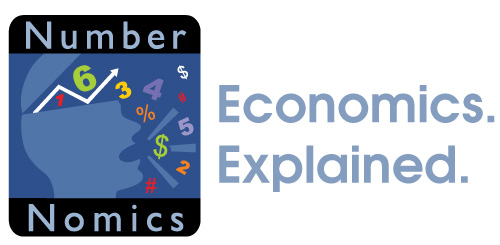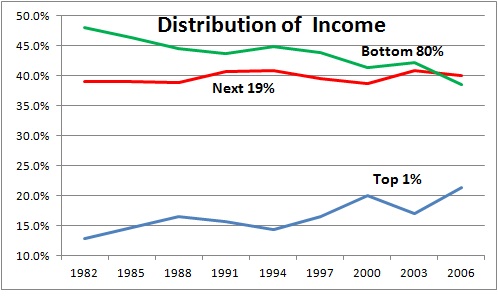October 14, 2011
The Occupy Wall Street protestors are concerned that compensation for the very rich is soaring while the average worker is barely making ends meet. In their words, “We the 99% will no longer tolerate the greed and corruption of the 1%”. They have a point.
The U.S. economy has always had a relatively unequal distribution of wealth and income because of the nature of our economy. The prospect of becoming the next Bill Gates or Steve Jobs provides inspiration for young entrepreneurs. Come up with a great idea, work hard, and the financial rewards are limitless.
But in the last 30 years the distribution of income has shifted dramatically as the very rich have gained a disproportionate share of income at the expense of those on the bottom. For example, the share of income received by the top 1% of income earners has climbed from 12.8% in 1982 to 21.3% in 2006. The recession has further skewed the distribution. In the last two years corporate profits have jumped 45% to a record high level, while median income remains somewhat below where it was prior to the onset of recession. To put these data in somewhat different terms, in the past 30 years the real income of corporate CEO’s has jumped by about 300%, while the real income of their production workers has risen by about 30%.
Who are these fabulously wealthy individuals? In the top 1% we have sports and entertainment superstars, successful investment bankers, venture capitalists, corporate attorneys, and CEO’s. The next 19% includes folks with college or advanced degrees. In the bottom 80% are those individuals who have at most a high school degree.
There are legitimate reasons why the income gap should have widened during the past 30 years.
First, rapid technological change in computers, software, and communications has changed not only what workers need to know, but the very nature of how they do their job. There is greater demand for, and a greater payoff to, those who have the skills to use this technology effectively. As a consequence, many low-paying, routine jobs have simply disappeared. Bookkeepers in the accounting profession quickly come to mind.
Second, there has been a widening income gap between college graduates and those with a high school education. Presumably, college grads can more easily embrace this new technology than those with less education. Indeed, technological skills have even widened the gap between college graduates with like degrees, or between workers in the same occupation. Who would you rather hire a liberal arts graduate who has sufficient technological skills to collect and analyze data, or another liberal arts graduate lacking such skills? On the factory floor a machinist able to utilize the latest technology is going to out earn one without that ability.
Third, globalization has played a role as many low-paying, routine jobs have simply disappeared overseas. The apparel industry is a good example.
Having said all of this, there is a disquieting feeling that those in power are able to boost their earnings unfairly. For example, corporate boards supposedly determine the CEO’s salary. While many boards hire an outside consultant which gives a veneer of respectability to the process, in the end the CEO typically gets what he wants. Keep in mind that those board members are often CEO’s of other companies. If the income of one CEO rises, it boosts the income of other CEO’s as well. If a board member objects he or she may well be replaced. Furthermore, the tax structure is so complicated that only those at the very top of the income structure are able to hire the highly paid attorneys and accountants to avoid those taxes.
This sense of frustration matters. Those who are getting left behind argue strongly for income redistribution which may contribute to the political gridlock we have seen in recent months. It creates uncertainty and fear which makes consumers less willing to spend and investors less willing to invest. Most importantly, this frustration can lead to civil unrest and protest movements. We have seen riots not only in Athens, but in less likely places like London and Rome. Now they have arrived here. The Occupy Wall Street movement is sending a clear message. Are our corporate leaders listening?
Stephen Slifer
NumberNomics
Charleston, SC


Follow Me